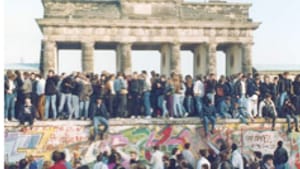Stay in the Loop
BSR publishes on a weekly schedule, with an email newsletter every Wednesday and Thursday morning. There’s no paywall, and subscribing is always free.
Lest we forget: Unsung heroes of the Berlin Wall
Berlin's lesson in peaceful revolution

This month Berlin celebrates the 20th anniversary of the fall of the Wall. News organizations the world over have marked the occasion. Heads of state traveled there and ceremoniously walked together across a line that ran beneath what was once one of the world's most heavily guarded national borders, imprisoning an entire country and symbolizing Soviet defiance against the Western world. The Wall's demise on November 9, 1989, is surely cause for celebration.
But much of the news coverage has ignored the pivotal role played by East Berliners themselves in this historic moment. Thanks to them, this monumental event took place peacefully.
After 44 years, the Cold War ended not with a bang but amid great confusion. A TV report broke the news softly that the borders between East and West Germany would be opened. Then word of mouth spread in East Berlin. This was the crucial moment: East Berliners had to discuss what to do next. Their decisions in all of those small groups across the city led to a peaceful mass movement.
In their neighborhoods, in barely organized fashion, they took the simple but remarkable action of spontaneously walking toward the checkpoints. They chose not to take weapons"“ a critical choice, given that the heavily armed border guards could have easily used the threat of violence as a pretext to open fire on the approaching crowds. A single shot might have triggered a quick melee and stampede, leading to widespread riots. Thousands could have been gunned down.
The power of TV
Instead, more and more East Berliners just kept showing up at the Wall unarmed. All they had brought with them was the power of that TV announcement and their hope that the guards had heard the news, too. They seem to have grasped instinctively that, in the Information Age, power comes not from the barrel of a gun but from the ability to communicate ideas.
It's difficult to imagine such a soft revolution actually succeeding. Real change is so often associated in history with righteous violent fury and bloodshed. We tend to forget that the tactics of passive resistance and/or friendly persuasion helped to drive the British out of India in 1947 without the firing of a single shot, and similarly caused the downfall of racial segregation in the U.S., apartheid in South Africa and the Marcos regime in the Philippines.
A better solution
Some might argue that it's dangerous to romanticize what took place in Berlin that day. For decades oppressed East Germans who tried to cross the Wall were shot down like dogs by a callous regime. Yet these everyday East Germans did not respond in kind. Instead they found a more effective solution.
In the end it was not Reagan or Gorbachev who had the last word about East Berlin; it was the East Berliners themselves. Without shouting "Charge!" or "Attack!", they changed everything for themselves, and for the world. In the end, their courageous restraint is what made the fall of the Berlin Wall one of history's most remarkable revolutionary events.
But much of the news coverage has ignored the pivotal role played by East Berliners themselves in this historic moment. Thanks to them, this monumental event took place peacefully.
After 44 years, the Cold War ended not with a bang but amid great confusion. A TV report broke the news softly that the borders between East and West Germany would be opened. Then word of mouth spread in East Berlin. This was the crucial moment: East Berliners had to discuss what to do next. Their decisions in all of those small groups across the city led to a peaceful mass movement.
In their neighborhoods, in barely organized fashion, they took the simple but remarkable action of spontaneously walking toward the checkpoints. They chose not to take weapons"“ a critical choice, given that the heavily armed border guards could have easily used the threat of violence as a pretext to open fire on the approaching crowds. A single shot might have triggered a quick melee and stampede, leading to widespread riots. Thousands could have been gunned down.
The power of TV
Instead, more and more East Berliners just kept showing up at the Wall unarmed. All they had brought with them was the power of that TV announcement and their hope that the guards had heard the news, too. They seem to have grasped instinctively that, in the Information Age, power comes not from the barrel of a gun but from the ability to communicate ideas.
It's difficult to imagine such a soft revolution actually succeeding. Real change is so often associated in history with righteous violent fury and bloodshed. We tend to forget that the tactics of passive resistance and/or friendly persuasion helped to drive the British out of India in 1947 without the firing of a single shot, and similarly caused the downfall of racial segregation in the U.S., apartheid in South Africa and the Marcos regime in the Philippines.
A better solution
Some might argue that it's dangerous to romanticize what took place in Berlin that day. For decades oppressed East Germans who tried to cross the Wall were shot down like dogs by a callous regime. Yet these everyday East Germans did not respond in kind. Instead they found a more effective solution.
In the end it was not Reagan or Gorbachev who had the last word about East Berlin; it was the East Berliners themselves. Without shouting "Charge!" or "Attack!", they changed everything for themselves, and for the world. In the end, their courageous restraint is what made the fall of the Berlin Wall one of history's most remarkable revolutionary events.
Sign up for our newsletter
All of the week's new articles, all in one place. Sign up for the free weekly BSR newsletters, and don't miss a conversation.

 Matthew Jakubowski
Matthew Jakubowski